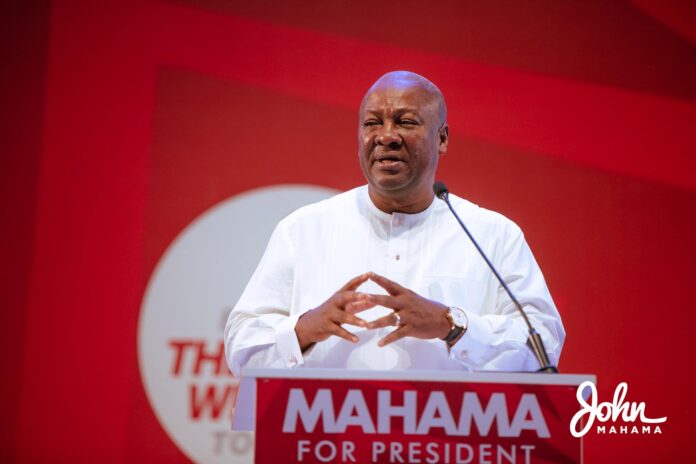The shadow of the challenges facing Free SHS has prompted many Ghanaians to question the feasibility and sustainability of the National Democratic Congress’ promise to cover academic facility user fees for Level 100 students.
The Launch of the NDC’s Youth Manifesto strategically on the International Youth Day wouldn’t have been enough news to generate conversations but for the “No Fees Stress Initiative”, which also echoed in the party’s manifesto launched in Winneba.
Despite the policy’s slogan suggesting ‘no stress’, there are lingering concerns among right-thinking Ghanaians due to the issues experienced with Free SHS. The policy’s viability is questionable, juxtaposing it against Free SHS.
Funding for tertiary education in Ghana has been inconsistent. From 1948 to the 1970s, it was fully government-funded. By the 1980s, it became partially funded with the introduction of academic facility and residential user fees.
In the spirit of development, the policy is commendable as it aligns with the constitutional provision in Article 25 (1)(c) of the 1992 Constitution, which states that “higher education shall be made equally accessible to all, on the basis of capacity, by every appropriate means, and in particular, by the progressive introduction of free education.” This gives legal backing to the policy, similar to Free SHS.
In the pursuit of the constitutional requirement, there are also frameworks in the educational sector the policy satisfies. The Education Strategic Plan (ESP) 2018-2030 aims to increase the gross enrollment rate in tertiary schools from 18 percent to 40 percent by 2030. Currently, the rate stands at 22%, a modest 4% increase over six years.
Ghana is among the few Sub-Saharan African countries with a tertiary gross enrollment rate exceeding 20%, significantly better than the regional average of 9.4%.
Given these statistics, it is projected that the gross enrollment in tertiary schools could surpass the current 22% if the policy is implemented.
Free SHS Issues vs. The Promise
According to Africa Education Watch’s (Eduwatch) Financial Burden Analysis of the Free SHS policy, secondary school enrollment increased from 813,448 in the 2016/17 academic year to 1.3 million in the 2022/23 academic year.
Over six years, an average of 422,940 students were enrolled annually in secondary schools, compared to an average of 260,490 annually before the policy. This means over 5.5 million students benefited from the policy according to the Finance Minister during the reading of the 2024 Mid-Year Budget Review.
Shifting the binoculars to tertiary institutions, the gross enrollment rate rose from 14% in 2014 to 22% over ten years, partly due to Free SHS. However, with the introduction of the “No Fees Stress Initiative,” the rhetorical question still lags, is the National Democratic Congress expecting a further surge in enrollment or not?
Pressure on Facilities
A policy cannot be fully praised unless it is seamless and leaves no future repercussions. The enrolment increase also portends a correlational pressure on facilities in the about 161 public tertiary institutions in Ghana.
One capital limitation that denies a chunk of students entry into tertiary education are the facilities to host them. Institutions caps the number of students they can admit, with accommodation being a primary concern. While the NDC’s proposed ‘Bed-for-All’ program aims to build more hostels and partner with the private sector, this will not immediately address the accommodation crisis for impending demand.
For example, Akenten Appiah-Menka University of Skills Training and Entrepreneurial Development cannot accommodate 95% of its admitted students, with 11,027 freshmen added to continuing students to total 30,453 this year.
Similarly, the University of Ghana, Legon admitted 16,000 freshmen but had bed spaces for only 6,000 in 2023, leaving 10,000 students to find accommodation elsewhere, which is also characterised with exploitation by private hostel owners and landlords.
These accommodation issues are Perennial and may worsen with the “No Fees Stress Policy.”
Capital Expenditure
The projected gross tertiary enrollment rate suggests a significant increase beyond the GH¢300 million annual expenditure quoted by the NDC. Following the implementation of Free SHS, allocated expenditure increased from GH¢400 million to GH¢1.1 billion, by the end of 2017. The following year, expenditure went beyond allocation and later a decline in allocation set in, making financial commitment to the policy recursive. Eventually, after 7 years of the policy running, an overwhelming GH¢9.9 billion was accounted to have been spent on Free SHS by the Finance Minister.
In 2017, the former Finance Minister, Ken Ofori-Atta indicated that government expenditure on priority programs, including Free SHS, grew by 38.8% annually. Given this experience, the NDC should carefully consider their projected GH¢300 million annual budget. Circumspection should lead than just the Social Democratic ideology.
Stakeholder Rejection
Former President John Mahama had promised a stakeholder dialogue on education within his first 100 days if elected, focusing on the Free SHS implementation issues. This raises the question of whether a similar engagement has been conducted for the “No Fees Stress Initiative.”
The University Teachers Association of Ghana (UTAG) has criticized the policy, suggesting it should target equitable distribution of funds and direct allocations to universities for bursaries and scholarships. UTAG also noted a significant decline in government funding, leaving universities to cover utility bills from their own resources.
Kofi Asare, Executive Director of Africa Education Watch, supports UTAG’s position, advocating for stakeholder engagement and objective analysis of the policy.
Ghanaians will have the opportunity to decide on whom the Chief Justice will swear into office on January 7, 2025. It is crucial for voters to ask pertinent questions about this policy before making their decision at the ballot box.


